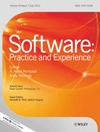
SOFTWARE-PRACTICE & EXPERIENCE
Scope & Guideline
Advancing software knowledge through rigorous research.
Introduction
Aims and Scopes
- Software Quality Assurance and Testing:
Research on methodologies and tools for ensuring software quality, including testing frameworks, defect prediction, and quality metrics. - Cloud and Edge Computing:
Studies focused on the architectural and operational challenges of cloud and edge computing, including resource management, service orchestration, and performance optimization. - Cybersecurity and Privacy:
Exploration of security threats in software systems, including methods for vulnerability detection, secure coding practices, and privacy-preserving techniques. - Artificial Intelligence and Machine Learning in Software Engineering:
Integration of AI and machine learning techniques into software development processes, including automated testing, predictive analytics, and intelligent decision-making. - Software Architecture and Design:
Investigations into software architecture principles, design patterns, and microservices, emphasizing their impact on system scalability, maintainability, and performance. - Human-Computer Interaction and User Experience:
Research on enhancing user experience through better software design, including user interface design, interaction patterns, and usability studies.
Trending and Emerging
- Artificial Intelligence and Machine Learning Applications:
A significant trend is the integration of AI and machine learning into software engineering practices, including automated testing, defect prediction, and intelligent software systems. - Microservices and Cloud-Native Architectures:
Research on microservices architecture has surged, focusing on its design, implementation, and operational challenges, particularly in cloud environments, as organizations transition to more scalable and flexible systems. - Edge Computing and IoT Solutions:
Emerging research themes include the development of edge computing frameworks and IoT solutions, emphasizing real-time data processing, resource management, and security in distributed environments. - Blockchain Technology in Software Systems:
There is an increasing focus on the application of blockchain technology for enhancing security, privacy, and trust in software applications, particularly in decentralized systems. - Sustainability and Energy Efficiency in Software Engineering:
Research is also trending towards sustainability, exploring energy-efficient solutions and practices in software development and deployment, reflecting global environmental concerns.
Declining or Waning
- Traditional Software Development Methodologies:
As agile and DevOps methodologies gain traction, traditional software development approaches such as waterfall have seen a decline in research focus, as practitioners seek more flexible and iterative processes. - Legacy Systems and Migration Strategies:
Research on legacy system management and migration strategies has waned as organizations increasingly adopt cloud-native and microservices architectures, reducing the relevance of legacy system concerns. - Desktop and Standalone Applications:
With the rise of web and mobile applications, there is a noticeable decline in research focused on traditional desktop applications, reflecting changing user preferences and technological advancements.
Similar Journals
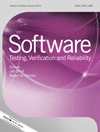
SOFTWARE TESTING VERIFICATION & RELIABILITY
Navigating the Landscape of Software Verification and ReliabilitySOFTWARE TESTING VERIFICATION & RELIABILITY, published by Wiley, serves as a premier journal in the fields of software engineering, risk management, and quality assurance. With an ISSN of 0960-0833 and E-ISSN 1099-1689, this journal has been a pivotal resource since its inception in 1991, providing insights into the latest methodologies and technologies related to software testing and verification through to 2024. The journal is recognized for its rigorous peer-review process and boasts an impressive reputation, rated Q2 in Media Technology and Safety, Risk, Reliability and Quality, along with a Q3 rank in Software as of 2023. Its Scopus ranks further solidify its standing within the academic community, placing it in the 62nd and 43rd percentiles for Engineering and Computer Science, respectively. The journal fosters a collaborative environment for researchers, professionals, and students, encouraging the exploration of cutting-edge research, applications, and innovations in software testing and reliability, making it an invaluable asset for those seeking to advance their knowledge and expertise in this essential area.

Journal of Web Engineering
Pioneering Research in Computer Networks and CommunicationsThe Journal of Web Engineering, published by RIVER PUBLISHERS, serves as a pivotal platform for researchers, professionals, and students interested in the expanding fields of web technologies and engineering. Since its inception in 2008, this journal has dedicated itself to advancing knowledge and promoting innovative practices in Computer Networks and Communications, Information Systems, and Software Engineering. With an impressive convergence of research up to 2024, its Q3 quartile ranking in both Computer Networks and Communications and Information Systems reflects the journal's commitment to the dissemination of high-quality, impactful research. Although it operates as a traditional access journal, it allows for vital contributions to be shared widely among a diverse readership. The Journal of Web Engineering's rankings in Scopus, including a percentile placement of 28th in Computer Networks and Communications, demonstrate its relevance and growing significance in the academic landscape. As the digital world continuously evolves, this journal remains a crucial resource for exploring the latest advancements and theoretical reflections within the realm of web engineering.

ACM TRANSACTIONS ON SOFTWARE ENGINEERING AND METHODOLOGY
Elevating Practices in Software Engineering and MethodologyACM Transactions on Software Engineering and Methodology, published by the Association for Computing Machinery, is a leading journal in the field of software engineering, featuring cutting-edge research and methodologies that influence practices and advancements in the discipline. Established in 1992, this journal boasts an impressive Q1 ranking in Software for the year 2023, signaling its high impact and relevance within the academic community. With its strong Scopus rank (#126/407) and a solid 69th percentile, it serves as a critical platform for scholars, practitioners, and students alike, promoting the dissemination of innovative ideas and solutions that drive the software industry forward. Although it operates without an open access option, it consistently publishes peer-reviewed articles, technological advancements, and case studies that shape the future of software engineering. The journal's commitment to quality and excellence makes it an essential read for anyone keen on understanding the complexities and methodologies transforming the field.
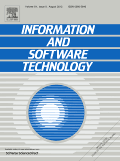
INFORMATION AND SOFTWARE TECHNOLOGY
Elevating Research Standards in Information and Software TechnologyINFORMATION AND SOFTWARE TECHNOLOGY, published by Elsevier, is a leading journal that stands at the forefront of the fields of software engineering, information systems, and computer science applications. Since its inception in 1970 and with a focus extending to 2025, this esteemed publication has made significant contributions to the discourse on technological advancements and innovations. In 2023, it has achieved a remarkable Q1 categorization across multiple domains, including Computer Science Applications, Information Systems, and Software, reflecting its excellence and relevance in the academic community. With Scopus rankings that place it in the top percentiles in its categories (85th, 83rd, and 83rd respectively), the journal serves as an essential platform for researchers, professionals, and students eager to disseminate and engage with cutting-edge research and developments. While it does not currently offer Open Access options, the knowledge curated within its pages remains invaluable for advancing the fields of information technology and software development.
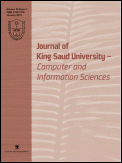
Journal of King Saud University-Computer and Information Sciences
Fostering Excellence in Global Technological ResearchJournal of King Saud University-Computer and Information Sciences, published by ELSEVIER, is a prestigious open-access journal focusing on the rapidly evolving fields of computer science and information technology. Since its inception in 1996, this journal has provided a platform for high-quality research and innovative ideas, promoting the dissemination of knowledge to a global audience. With a remarkable impact factor and ranked Q1 in the Computer Science (miscellaneous) category as of 2023, it stands among the top 11% of journals in its field, reflecting its commitment to excellence and relevance. The journal proudly carries the ISSN 1319-1578 and E-ISSN 2213-1248, and it is based in Saudi Arabia while being part of a global academic network. With a Scopus rank of #26 out of 232 in general computer science, the Journal of King Saud University-Computer and Information Sciences is an essential resource for researchers, professionals, and students seeking to stay at the forefront of technological advancement. As it continues to thrive through 2024, it invites contributions that will shape the future of computing and information sciences.

PROGRAMMING AND COMPUTER SOFTWARE
Advancing Software Development Through Rigorous ResearchPROGRAMMING AND COMPUTER SOFTWARE is a distinguished journal committed to advancing the field of software development and programming methodologies. Published by PLEIADES PUBLISHING INC, this journal has been a valuable resource since its inception in 1978, reaching out to researchers, professionals, and students alike. With an emphasis on rigorous peer-reviewed articles, the journal holds a Q3 ranking in the realm of Software according to the latest 2023 Category Quartiles. Though it does not offer open access, the journal ensures that high-quality research is disseminated to its audience, providing insights into evolving programming techniques, software engineering challenges, and innovative solutions. With its convergence of years extending to 2024, PROGRAMMING AND COMPUTER SOFTWARE remains a pivotal publication, fostering a deeper understanding of the complexities in computer programming while supporting the broader software community.

Automated Software Engineering
Leading the Charge in Software Engineering AdvancementsAutomated Software Engineering is a premier journal dedicated to advancing the field of software engineering through the exploration of innovative methodologies, tools, and applications. Published by Springer since its inception in 1994, this journal has established itself as a vital resource for researchers, industry professionals, and students alike, providing insights into the latest trends and technological advancements. With an impressive impact factor and currently ranked in the Q2 quartile of the Software category, it is recognized for its contribution to the discipline. The journal covers a broad scope of topics including automation in software development, empirical studies, and theoretical advancements, fostering discussions that bridge academia and industry. As we look forward to converging towards the year 2024, the journal continues to invite high-quality submissions that challenge existing paradigms and pave the way for future innovations in software engineering.

JOURNAL OF COMPUTER SCIENCE AND TECHNOLOGY
Empowering Research in the Digital AgeJOURNAL OF COMPUTER SCIENCE AND TECHNOLOGY, published by Springer Singapore Pte Ltd, is a pivotal platform in the rapidly evolving realms of computer science and technology. With an ISSN of 1000-9000 and an E-ISSN of 1860-4749, this journal encompasses a diverse array of topics including computational theory, hardware and architecture, software engineering, and applications of computer science. Spanning over three decades from 1986 to 2024, it boasts an impressive standing within academic circles, ranking in the Q2 quartile across several key categories and achieving notable placement in Scopus metrics. Although this journal operates under a subscription-based model, it remains a crucial resource for researchers, professionals, and students seeking to advance their knowledge and contribute to discussions in computer science. The JOURNAL OF COMPUTER SCIENCE AND TECHNOLOGY is committed to fostering innovation and scholarly communication in the field, encouraging submissions that contribute substantive advancements in theory and application.
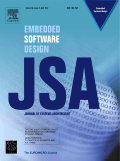
JOURNAL OF SYSTEMS ARCHITECTURE
Pioneering Discoveries in Computer SystemsJOURNAL OF SYSTEMS ARCHITECTURE is a prestigious academic journal published by ELSEVIER, based in the Netherlands, that has established itself as a leading platform for research in the fields of Hardware and Architecture and Software. With an impressive impact factor and ranked in the Q1 category for both computer science sectors, this journal is recognized for its high-quality contributions, evidenced by its Scopus ranking of #32 in Hardware and Architecture and #74 in Software, placing it in the top percentiles of its field. The journal spans a wide range of topics central to systems architecture, focusing on innovative research that advances the understanding of computer systems and promotes future developments. Researchers, professionals, and students alike will find invaluable insights and emerging trends that address the challenges and opportunities within the rapidly evolving field of systems design and architecture. Spanning from 1996 to 2024, the JOURNAL OF SYSTEMS ARCHITECTURE continues to be a vital resource for those seeking to stay at the forefront of technology and research.
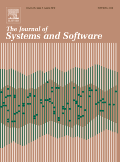
JOURNAL OF SYSTEMS AND SOFTWARE
Exploring the Nexus of Hardware and Software Architecture.JOURNAL OF SYSTEMS AND SOFTWARE, published by Elsevier Science Inc, is a premier academic journal that serves as a vital platform for the dissemination of cutting-edge research in the fields of software engineering, information systems, and hardware architecture. With an impressive impact factor and consistently ranking in the Q1 category across several relevant sectors, including hardware and architecture (ranked 33rd out of 177), information systems (ranked 72nd out of 394), and software (ranked 75th out of 407) as of 2023, this journal is recognized for its rigorous peer-review process and high-quality publications. Established in 1979, the journal has become an essential resource for researchers, professionals, and students looking to stay abreast of the latest advancements and emerging trends in systems and software. While the journal does not currently operate under an open-access model, it ensures wide visibility through its indexed publications and is dedicated to advancing scholarly discourse in computer science. With contributions from leading experts in the field, JOURNAL OF SYSTEMS AND SOFTWARE continues to shape the landscape of software and systems research.